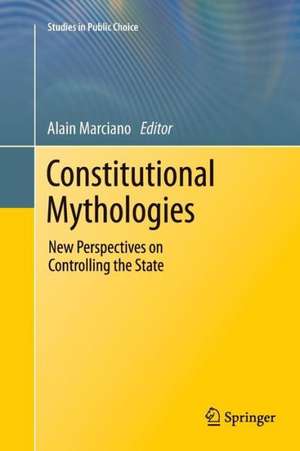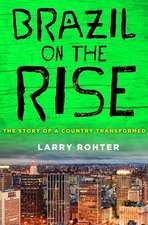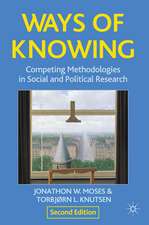Constitutional Mythologies: New Perspectives on Controlling the State: Studies in Public Choice, cartea 23
Editat de Alain Marcianoen Limba Engleză Paperback – 24 oct 2013
| Toate formatele și edițiile | Preț | Express |
|---|---|---|
| Paperback (1) | 635.15 lei 43-57 zile | |
| Springer – 24 oct 2013 | 635.15 lei 43-57 zile | |
| Hardback (1) | 641.20 lei 43-57 zile | |
| Springer – 2 aug 2011 | 641.20 lei 43-57 zile |
Din seria Studies in Public Choice
-
 Preț: 542.84 lei
Preț: 542.84 lei - 18%
 Preț: 958.38 lei
Preț: 958.38 lei - 20%
 Preț: 579.92 lei
Preț: 579.92 lei - 18%
 Preț: 780.82 lei
Preț: 780.82 lei -
 Preț: 395.09 lei
Preț: 395.09 lei - 5%
 Preț: 370.58 lei
Preț: 370.58 lei -
 Preț: 381.81 lei
Preț: 381.81 lei - 18%
 Preț: 1228.77 lei
Preț: 1228.77 lei - 15%
 Preț: 637.46 lei
Preț: 637.46 lei - 18%
 Preț: 942.63 lei
Preț: 942.63 lei - 15%
 Preț: 640.71 lei
Preț: 640.71 lei - 15%
 Preț: 633.53 lei
Preț: 633.53 lei - 18%
 Preț: 945.62 lei
Preț: 945.62 lei - 20%
 Preț: 560.55 lei
Preț: 560.55 lei - 18%
 Preț: 947.50 lei
Preț: 947.50 lei - 15%
 Preț: 632.37 lei
Preț: 632.37 lei - 15%
 Preț: 634.49 lei
Preț: 634.49 lei - 15%
 Preț: 635.01 lei
Preț: 635.01 lei - 15%
 Preț: 638.89 lei
Preț: 638.89 lei -
 Preț: 381.81 lei
Preț: 381.81 lei - 15%
 Preț: 640.88 lei
Preț: 640.88 lei -
 Preț: 385.62 lei
Preț: 385.62 lei -
 Preț: 393.13 lei
Preț: 393.13 lei - 15%
 Preț: 697.00 lei
Preț: 697.00 lei - 15%
 Preț: 586.70 lei
Preț: 586.70 lei -
 Preț: 389.31 lei
Preț: 389.31 lei - 15%
 Preț: 643.84 lei
Preț: 643.84 lei - 18%
 Preț: 727.00 lei
Preț: 727.00 lei
Preț: 635.15 lei
Preț vechi: 747.23 lei
-15% Nou
Puncte Express: 953
Preț estimativ în valută:
121.57€ • 132.10$ • 102.19£
121.57€ • 132.10$ • 102.19£
Carte tipărită la comandă
Livrare economică 21 aprilie-05 mai
Preluare comenzi: 021 569.72.76
Specificații
ISBN-13: 9781461429562
ISBN-10: 1461429560
Pagini: 188
Ilustrații: VIII, 180 p.
Dimensiuni: 155 x 235 x 10 mm
Greutate: 0.27 kg
Ediția:2011
Editura: Springer
Colecția Springer
Seria Studies in Public Choice
Locul publicării:New York, NY, United States
ISBN-10: 1461429560
Pagini: 188
Ilustrații: VIII, 180 p.
Dimensiuni: 155 x 235 x 10 mm
Greutate: 0.27 kg
Ediția:2011
Editura: Springer
Colecția Springer
Seria Studies in Public Choice
Locul publicării:New York, NY, United States
Public țintă
ResearchCuprins
Binding Contract or Evolving Focal Point of Coordination: The Meaning of Constitutional Political Economy.- Consent, or Coercion? A Critical Analysis of the Constitutional Contract.- Identity, Constitutions and Constitutional Political Economy.- Power Relations in the Canadian Constitution: The Myths We are Expected to Believe.- Checks and Balances at the OK Corral: Restraining Leviathan.- Popular Sovereignty: A Case Study from the Antebellum Era.- The Constitution of a Direct Democracy.- Constitutional Political Economy.- The Myth of the Constitution as an Economic Document – Do Constitutions Enable Entire Societies to Make Them Better Off?- The European Court of Justice. a Guarantor or a Ianus Geminus?- A Comparison of Central Bank and Judicial Independence.- The Dual Rationale of Judicial Independence in Constitutional Discourse.
Textul de pe ultima copertă
Our societies obviously rest on common beliefs. These "myths" are tools that help us to develop and build common identities; they form the structure around which societies function. This does not imply that these beliefs are “true,” in the sense that they would be supported by empirical facts. In social matters, myths have undoubtedly important functions to play even if no empirical facts support them. On the other hand, and precisely because they are not discussed, myths may be problematic: they may create illusions, conserve structures that are inefficient and unable to improve the situation of citizens. This is particularly true with constitutions. Constitutions are very important for societies: a constitution is a document — even in societies based on “unwritten” constitutions — which binds citizens together, creating unity among them, and which forms the framework within which our activities take place. As Nobel Prize laureate James Buchanan used to say, "Constitutions contain the rules of the social game we play in our everyday life."
However, constitutions are not frequently debated by citizens. This is why we end up with common beliefs about these constitutions: they are above our heads, around us. We take them, their role, function, and nature as given. The purpose of this volume to investigate and challenge common constitutional myths. Featuring contributions from prominent economists, political scientists, and legal scholars, the chapters in this volume address such myths as “constitutions are binding social contracts,” “constitutions are economic documents” and “constitutions are legal documents.” Illustrating their analyses with historical and contemporary examples from the United States, Canada, and Europe, the authors build a multi-layered approach to understanding constitutions and their implications for social and political influence.
However, constitutions are not frequently debated by citizens. This is why we end up with common beliefs about these constitutions: they are above our heads, around us. We take them, their role, function, and nature as given. The purpose of this volume to investigate and challenge common constitutional myths. Featuring contributions from prominent economists, political scientists, and legal scholars, the chapters in this volume address such myths as “constitutions are binding social contracts,” “constitutions are economic documents” and “constitutions are legal documents.” Illustrating their analyses with historical and contemporary examples from the United States, Canada, and Europe, the authors build a multi-layered approach to understanding constitutions and their implications for social and political influence.
Caracteristici
First book to focus on the myths about constitutions that perpetuate misconceptions and faulty analysis and policy Contributors are experts in public choice and constitutional political economy (including editors of several Springer journals), and representing perspectives from economics, political science, and law International coverage, with historical and contemporary examples from North America and Europe














